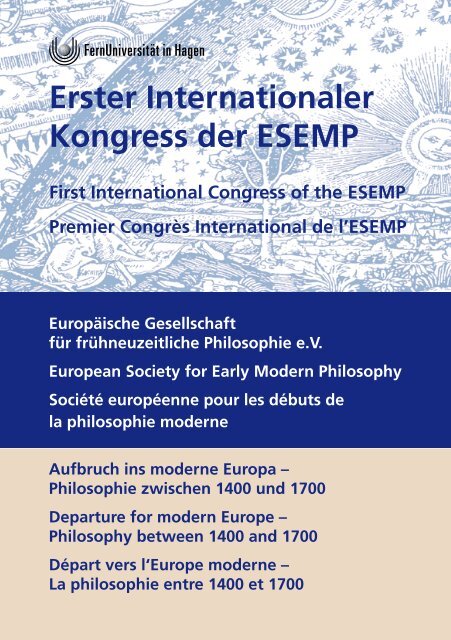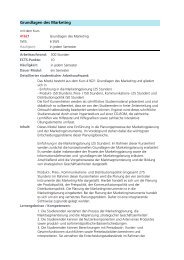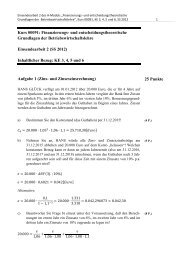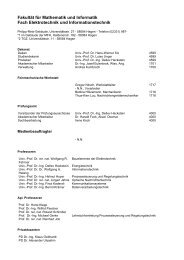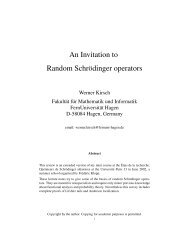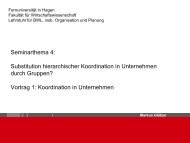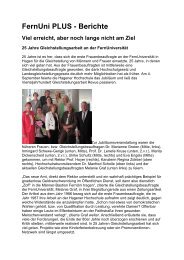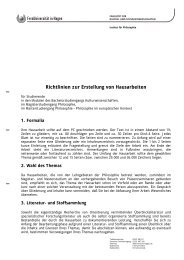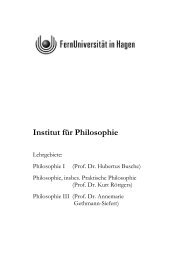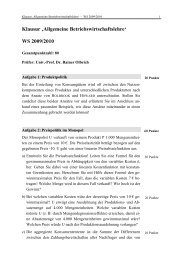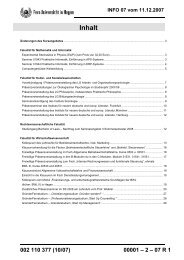Erster Internationaler Kongress der ESEMP - FernUniversität in Hagen
Erster Internationaler Kongress der ESEMP - FernUniversität in Hagen
Erster Internationaler Kongress der ESEMP - FernUniversität in Hagen
Erfolgreiche ePaper selbst erstellen
Machen Sie aus Ihren PDF Publikationen ein blätterbares Flipbook mit unserer einzigartigen Google optimierten e-Paper Software.
<strong>Erster</strong> <strong>Internationaler</strong><strong>Kongress</strong> <strong>der</strong> <strong>ESEMP</strong>First International Congress of the <strong>ESEMP</strong>Premier Congrès International de l’<strong>ESEMP</strong>Europäische Gesellschaftfür frühneuzeitliche Philosophie e.V.European Society for Early Mo<strong>der</strong>n PhilosophySociété européenne pour les débuts dela philosophie mo<strong>der</strong>neAufbruch <strong>in</strong>s mo<strong>der</strong>ne Europa –Philosophie zwischen 1400 und 1700Departure for mo<strong>der</strong>n Europe –Philosophy between 1400 and 1700Départ vers l‘Europe mo<strong>der</strong>ne –La philosophie entre 1400 et 1700
Schirmherr des <strong>Kongress</strong>es ist <strong>der</strong> M<strong>in</strong>ister für Innovation, Wissenschaft,Forschung und Technologie des Landes Nordrhe<strong>in</strong>-Westfalen,Herr Prof. Dr. Andreas P<strong>in</strong>kwart.Der <strong>Kongress</strong> wird ermöglicht durch die freundliche Unterstützung vonGesellschaft <strong>der</strong> Freunde<strong>der</strong> FernUniversität e. V.M<strong>in</strong>isterium für Innovation,Wissenschaft, Forschungund Technologie des LandesNordrhe<strong>in</strong>-WestfalenProf. Dr. Hans-Joachim Langmann(E. Merck OHG)ImpressumHerausgeberVerantwortlichGestaltungMärz 2007Europäische Gesellschaft für frühneuzeitliche Philosophie e.V.Prof. Dr. Hubertus BuscheGabriele GruchotDezernat 2.6
<strong>Erster</strong> <strong>Internationaler</strong> <strong>Kongress</strong> <strong>der</strong> <strong>ESEMP</strong>First International Congress of the <strong>ESEMP</strong>Premier Congrès International de l’<strong>ESEMP</strong>Aufbruch <strong>in</strong>s mo<strong>der</strong>ne Europa –Philosophie zwischen 1400 und 1700Departure for mo<strong>der</strong>n Europe –Philosophy between 1400 and 1700Départ vers l‘Europe mo<strong>der</strong>ne –La philosophie entre 1400 et 170026. - 30. März 200726 th - 30 th March 200726 ème - 30 ème Mars 2007
BOARD OF THE <strong>ESEMP</strong>Hubertus Busche (president),Stefan Heßbrüggen-Walter (secretary),Katia Saporiti (treasurer),Ruth <strong>Hagen</strong>gruber, Kar<strong>in</strong> Hartbecke,Cees Leijenhorst, Thomas Le<strong>in</strong>kauf,Antonio Nunziante,Ralph SchumacherFernUniversität <strong>in</strong> <strong>Hagen</strong>Institut für PhilosophieLehrgebiet Philosophie IUniversitätsstraße 4158084 <strong>Hagen</strong>GermanyTel.: +49 23 31 / 9 87 - 21 50Fax: +49 23 31 / 9 87 - 46 02e-mail: <strong>ESEMP</strong>@FernUni-<strong>Hagen</strong>.deHomepage: www.esemp.de
VERANSTALTUNGSORT / PLACE OF EVENT /LIEU DE LA MANIFESTATIONHaus <strong>der</strong> Technik, Hollestraße 1, D - 45127 EssenVERANSTALTER / ORGANIZER / ORGANISATEUREuropäische Gesellschaft für frühneuzeitliche Philosophie e.V. (<strong>ESEMP</strong>) /European Society for Early Mo<strong>der</strong>n Philosophy /Société européenne pour les débuts de la philosophie mo<strong>der</strong>ne,<strong>in</strong> Verb<strong>in</strong>dung mit dem Kulturwissenschaftlichen Institut Essen (KWI)WISSENSCHAFTLICHE KONZEPTION / SCIENTIFIC CONCEPTION /CONCEPTION SCIENTIFIQUEProf. Dr. Hubertus BuscheORGANISATION / ORGANISATION / ORGANISATIONProf. Dr. Hubertus Busche, Dr. Stefan Heßbrüggen-Walter(Präsident und Geschäftsführer <strong>der</strong> <strong>ESEMP</strong>)unter Mitarbeit von PD Dr. Friedrich Jaeger (KWI)MITARBEITER / COLLABORATORS / COLLABORATEURSAstrid Canzler, Claudia Imhoff M.A., apl. Prof. Dr. Thomas Keutner,Horst Mayer, Ulrike Müller-Bruhnke M.A., Stefan Re<strong>in</strong><strong>in</strong>g,Christiane Scheeren B.A., Kay Zenker
Sehr geehrte Damen und Herren,liebe Kolleg<strong>in</strong>nen und Kollegen,liebe Mitglie<strong>der</strong> <strong>der</strong> <strong>ESEMP</strong>,<strong>der</strong> Vorstand <strong>der</strong> Europäischen Gesellschaft für frühneuzeitliche Philosophie e.V.begrüßt Sie herzlich zum Ersten Internationalen <strong>Kongress</strong> <strong>der</strong> <strong>ESEMP</strong> „Aufbruch <strong>in</strong>smo<strong>der</strong>ne Europa – Philosophie zwischen 1400 und 1700“.Wir wünschen Ihnen e<strong>in</strong>en angenehmen Aufenthalt <strong>in</strong> Essen, spannende Vorträgeund Diskussionen während des <strong>Kongress</strong>es sowie anregende Gespräche mit IhrenKolleg<strong>in</strong>nen und Kollegen.Mit den besten GrüßenDer Vorstand <strong>der</strong> <strong>ESEMP</strong>Dear Sir or Madam,dear colleagues,dear <strong>ESEMP</strong>-members,the board of the European Society for Early Mo<strong>der</strong>n Philosophy cordially welcomesyou to the First International Congress of the <strong>ESEMP</strong> “Departure for Mo<strong>der</strong>n Europe- Philosophy between 1400 and 1700”.We wish you a pleasant stay <strong>in</strong> Essen, stimulat<strong>in</strong>g papers and discussions at ourcongress as well as <strong>in</strong>terest<strong>in</strong>g encounters with your colleagues.Best regardsThe Board of the <strong>ESEMP</strong>Mesdames et Messieurs,chères collègues, chers collègues,chers membres de l‘<strong>ESEMP</strong>,le comité directeur de la Société européenne pour les débuts de la philosophie mo<strong>der</strong>nevous salue cordialement au Premier Congrès International de l‘<strong>ESEMP</strong> „Départvers l`Europe mo<strong>der</strong>ne – La philosophie entre 1400 et 1700“.Nous vous souhaitons un séjour agréable à Essen, des exposés et des discussions captivantspendant le congrès a<strong>in</strong>si que des conversations animées avec vos collègues.Meilleures salutationsLe comité directeur de l‘<strong>ESEMP</strong>
M<strong>in</strong>isterium für Innovation,Wissenschaft, Forschungund Technologie des LandesNordrhe<strong>in</strong>-WestfalenGeleitwort des M<strong>in</strong>isters für Innovation, Wissenschaft, Forschung undTechnologie des Landes Nordrhe<strong>in</strong>-WestfalenEuropa wird se<strong>in</strong>e Zukunft nur gestalten können, wenn es se<strong>in</strong>e Vergangenheit kennt.Mit den Worten des Historikers He<strong>in</strong>rich August W<strong>in</strong>kler: „Das Projekt des Westens istunvollendet und wird es vermutlich immer bleiben. Aber es lässt sich weiterentwickeln.“Nicht durch feierliches Beschwören o<strong>der</strong> aggressives Dom<strong>in</strong>anzgebaren, wohl aber durchdas Ernstnehmen <strong>der</strong> eigenen Herkunft und die engagierte Verteidigung <strong>der</strong> Streitkultur<strong>in</strong> <strong>der</strong> pluralistischen Zivilgesellschaft, wie W<strong>in</strong>kler bei se<strong>in</strong>er Abschiedsvorlesung an <strong>der</strong>Berl<strong>in</strong>er Humboldt-Universität betonte.Arbeit an e<strong>in</strong>em unvollendeten Projekt - e<strong>in</strong>e gute Beschreibung für den Ersten Internationalen<strong>Kongress</strong> <strong>der</strong> Europäischen Gesellschaft für frühneuzeitliche Philosophie(European Society for Early Mo<strong>der</strong>n Philosophy, <strong>ESEMP</strong>). “Aufbruch <strong>in</strong>s mo<strong>der</strong>ne Europa– Philosophie <strong>in</strong> Europa zwischen 1400 und 1700“, lautet se<strong>in</strong> Thema. Sich <strong>der</strong> Ursprüngedes mo<strong>der</strong>nen Europas zu vergewissern, das ist die Aufgabe, <strong>der</strong> er sich stellt. Nicht um<strong>der</strong> selbstgenügsamen akademischen Gelehrsamkeit willen, wie die Initiatoren betonen,son<strong>der</strong>n um die Ideen zu erkunden, die das Projekt Europa begründen und treiben. Undum uns auf diese Weise <strong>in</strong> die Lage zu versetzen, europäischer zu denken und klüger zuhandeln – <strong>in</strong> e<strong>in</strong>er politischen E<strong>in</strong>heit, die von <strong>der</strong> Vielfalt ihrer Traditionen lebt.Der Horizont ist weit: Es geht um die Ursprünge und die Reichweite e<strong>in</strong>es gewaltigenMo<strong>der</strong>nisierungsprozesses, <strong>der</strong> noch immer unseren Alltag prägt. Dieser Dimensionentsprechen das Themenspektrum und die <strong>in</strong>ternationale Rednerliste e<strong>in</strong>es bestechendselbstbewussten Programms. Ohne viel Aufhebens stellen sich hier Geisteswissenschaftlerals Nach- und Vordenker mitten h<strong>in</strong>e<strong>in</strong> <strong>in</strong> die entscheidenden Debatten unserer Gegenwart.Dafür danke ich den Organisatoren und För<strong>der</strong>ern des <strong>Kongress</strong>es und allen Forscher<strong>in</strong>nenund Forschern, die zu se<strong>in</strong>em Gel<strong>in</strong>gen beitragen. Herzlich willkommen im Ruhrgebiet,das vielleicht nicht zufällig zur Heimat <strong>der</strong> <strong>ESEMP</strong> mit Sitz an <strong>der</strong> Fernuniversität<strong>Hagen</strong> geworden ist und zum Gastgeber ihres ersten <strong>in</strong>ternationalen <strong>Kongress</strong>es, <strong>in</strong>Zusammenarbeit mit dem Kulturwissenschaftlichen Institut! Diese Region erlebt gewaltigeMo<strong>der</strong>nisierungsprozesse und weiß sehr genau: Strukturwandel nicht erleiden,son<strong>der</strong>n gestalten - das geht nur im europäischen Kontext.Es sollte daher wohl besser heißen: Willkommen, tief im Westen und mitten <strong>in</strong> Europa!Ich wünsche Ihnen ganz herzlich gute Vorträge und lebhafte Diskussionen.Prof. Dr. Andreas P<strong>in</strong>kwart
13:00 Öffnung des <strong>Kongress</strong>büros im Haus <strong>der</strong> TechnikOpen<strong>in</strong>g of the congress office at Haus <strong>der</strong> TechnikOuverture du bureau du congrès au Haus <strong>der</strong> TechnikMontag, 26. März 2007 - Monday, March 26th 2007 - Lundi, 26 Mars 2007Eröffnungsveranstaltung / Open<strong>in</strong>g event / Ouverture(Saal / Hall / Salle A 1 / A 2)17:00 Eröffnung durch den Präsidenten <strong>der</strong> <strong>ESEMP</strong>Inaugural Address by the President of the <strong>ESEMP</strong>Paroles <strong>in</strong>augurales du président de l‘<strong>ESEMP</strong>Prof. Dr. Hubertus Busche Grußworte des M<strong>in</strong>isters für Innovation, Wissenschaft, Forschungund Technologie des Landes NRWWelcome Address by the M<strong>in</strong>ister of Innovation, Science, Research,and Technology of the State of North Rh<strong>in</strong>e-WestphaliaParoles de bienvenue du m<strong>in</strong>istre d‘<strong>in</strong>novation, de la science, de rechercheet de la technologie du land de Rhénanie du Nord/Westphaliei. V. Dr. Michael Schmidt, Referent Grußworte des Rektors <strong>der</strong> FernUniversität <strong>in</strong> <strong>Hagen</strong>Welcome Address by the President of the FernUniversität <strong>in</strong> <strong>Hagen</strong>Paroles de bienvenue du recteur de la FernUniversität à <strong>Hagen</strong>Prof. Dr. Helmut Hoyer
17:30 Geleitworte des Präsidenten <strong>der</strong> Deutschen Gesellschaftfür PhilosophieIntroductory Oration by the President of the Deutsche Gesellschaftfür PhilosophieDiscours du président de la Deutsche Gesellschaft für PhilosophieProf. Dr. Dr. h.c. Carl Friedrich Gethmann Ansprache des Repräsentanten des KulturwissenschaftlichenInstituts EssenIntroductory Remarks by the Representative from theKulturwissenschaftliches Institut EssenDiscours du représentant du Kulturwissenschaftliches Institut EssenPD Dr. Friedrich Jaeger Programmatischer Vortrag zur <strong>ESEMP</strong> und zum <strong>Kongress</strong>Programmatic Introduction to the <strong>ESEMP</strong> and its First CongressDiscours sur l‘<strong>ESEMP</strong> et le congrès du président de l‘<strong>ESEMP</strong>Prof. Dr. Hubertus Busche18:30 Pause / Break / Pause19:00 Festvortrag / Keynote lecture / Conférence festive:Drei Pioniere <strong>der</strong> Mo<strong>der</strong>ne: Machiavelli, Bacon, HobbesProf. Dr. Dr. h.c. Otfried HöffeMontag, 26. März 2007 - Monday, March 26th 2007 - Lundi, 26 Mars 2007
15:00 - 19:00Sektion I / Section I / Section I (Saal / Hall / Salle 811):Die Entdeckung <strong>der</strong> Ökonomie als e<strong>in</strong>es Motors gesellschaftlichenFortschritts – Von den Florent<strong>in</strong>er Stadtbürgerhumanisten über dieprotestantische Ethik bis zu MandevilleThe Discovery of Economy as a Motor for Social Progress –From the Florent<strong>in</strong>e Civil Humanists via the ‚Protestant Ethics‘ untilMandevilleLa découverte de l‘économie comme moteur de progrès social –Des humanistes civils florent<strong>in</strong>s en passant par l‘éthiqueprotestante jusqu‘à MandevilleSektionsleitung / Section chair / Direction de la section:Prof. Dr. Lars Magnusson (Uppsala)Vortragende / Lecturers / Conférenciers:15:00 Prof. Dr. Karel Davids (Amsterdam): Divergence and Convergence <strong>in</strong> Economic Discourse <strong>in</strong>Early Mo<strong>der</strong>n Europe16:00 Prof. Dr. Rudolf Schüßler (Bayreuth): Early Mo<strong>der</strong>n Casuistry and the Weber Thesis17:00 Justus Nipperdey M.A. (München): Die Ökonomisierung des Politischen <strong>in</strong> <strong>der</strong> Frühen Neuzeit18:00 Dr. Matthias Ste<strong>in</strong>br<strong>in</strong>k (München): Towards the Tax State: Early Mo<strong>der</strong>n F<strong>in</strong>ancial andFiscal DevelopmentsDienstag, 27. März 2007 - Tuesday, March 27th 2007 - Mardi, 27 Mars 200713
15:00 - 19:00Sektion II / Section II / Section II (Saal / Hall / Salle A 2):Dienstag, 27. März 2007 - Tuesday, March 27th 2007 - Mardi, 27 Mars 2007Wissenschaftlicher Fortschritt – Die frühneuzeitliche Diskussion um se<strong>in</strong>eKriterien und se<strong>in</strong>en praktischen KontextScientific Progress – The Early Mo<strong>der</strong>n Discussion of its Criteriaand its Practical ContextLe progrès scientifique – La discussion de ses critères et de soncontexte practiqueSektionsleitung / Section chair / Direction de la section:Prof. Dr. Katia Saporiti (Zürich)Vortragende / Lecturers / Conférenciers:15:00 Prof. Dr. Eberhard Knobloch (Berl<strong>in</strong>): Die Diskussion <strong>der</strong> Kriterien des wissenschaftlichen Fortschritts vonBacon bis Kepler16:00 Prof. Dr. Michael Hampe (Zürich): Konstruktion und Wirklichkeit: Probleme <strong>der</strong> philosophischenMethode bei Thomas Hobbes17:00 Prof. Dr. Vitaly Gorokhov (Moskau/Karlsruhe): Wissenschaftlicher Fortschritt bei Galilei18:00 Dr. Jérémie Griard (Montréal): La conception leibnizienne du progrès scientifique14
15:00 - 19:00Sektion III / Section III / Section III (Saal / Hall / Salle A 1):Wandel und Kritik des höchsten Gutes – Spiegel <strong>der</strong> Entteleologisierungund Individualisierung des Handlungshorizontes?Change and Criticism of the Highest Good – Mirror of the Deteleologizationand Individualization of the Horizon of Action?Changement et critique du plus haut bien – Reflet de la detéléologisationet de l‘<strong>in</strong>dividualisation de l‘horizon de l‘action?Sektionsleitung / Section chair / Direction de la section:Prof. Dr. Jan Peter Beckmann (<strong>Hagen</strong>)Vortragende / Lecturers / Conférenciers:15:00 Prof. Dr. Matthias Kaufmann (Halle): Die Willensfreiheit, das moralisch Gute und das Ziel des Menschenbei Duns Scotus, Ockham und Mol<strong>in</strong>a16:00 Prof. Dr. Mart<strong>in</strong> Stone (Löwen): Tradition and Innovation <strong>in</strong> the Moral Psychology of the Jesuits:Mol<strong>in</strong>a and Suarez17:00 Stephan Schmid M.A. (Berl<strong>in</strong>): Zwecke, Handlungen und Streben bei Sp<strong>in</strong>oza zwischen Teleologieund Naturalismus18:00 Prof. Dr. Werner Stegmaier (Greifswald): Start-Paradoxien mo<strong>der</strong>ner Orientierung: Über Sp<strong>in</strong>ozas ‚Ethik’ undihr höchstes Gut im Blick auf Luhmanns SystemtheorieDienstag, 27. März 2007 - Tuesday, March 27th 2007 - Mardi, 27 Mars 200715
15:00 - 19.00Sektion IV / Section IV / Section IV (Saal / Hall / Salle B):Dienstag, 27. März 2007 - Tuesday, March 27th 2007 - Mardi, 27 Mars 2007Zuwendung zu den Alten als Abwendung vom Mittelalter? –Aspekte und Interessen bei <strong>der</strong> Wie<strong>der</strong>aneignung antiker PhilosophenThe Turn towards Antiquity as a Detachment from Medieval Thought? –Aspects and Interests of the Rediscover<strong>in</strong>g of Ancient PhilosophersLe tour vers l‘antiquité comme détachement de la pensée médiévale? –Aspects et <strong>in</strong>térêts de la redécouverte des philosophes antiquesSektionsleitung / Section chair / Direction de la section:Prof. Dr. Thomas Le<strong>in</strong>kauf (Münster)Vortragende / Lecturers / Conférenciers:15:00 Prof. Dr. Miguel Angel Granada (Barcelona): Die Entwicklung <strong>der</strong> Auffassungen über das Verhältnis von Antike,Mittelalter und Gegenwart von Fic<strong>in</strong>o bis Bruno16:00 Prof. Dr. Arbogast Schmitt (Marburg): Die ‚Neuentdeckung’ hellenistischer Konzepte <strong>der</strong> Vorstellungskraft –Ihre Bedeutung für das Rationalitätsverständnis <strong>der</strong> Neuzeit17:00 Lutz Bergemann M.A. (Berl<strong>in</strong>): ’Plastic nature‘ als ‚Hexis‘: Transformation e<strong>in</strong>es hellenistischenKonzepts unter neuplatonischer Perspektive <strong>in</strong> <strong>der</strong> Philosophie RalphCudworths18:00 Prof. Dr. Georges J. D. Moyal (York): Métaphysique et praxis dans la VIème Méditation Cartesienne16
15:00 - 19.00Workshop I (Saal / Hall / Salle 901):Zwischen Utopie, Glaube und Vernunft –Wege <strong>der</strong> Alchemie im 16. und 17. Jahrhun<strong>der</strong>tBetween Utopia, Faith and Reason –Pathways of Alchemy dur<strong>in</strong>g the 16th and 17th CenturyEntre l‘utopie, la foi et la raison –Chem<strong>in</strong>ement de l‘alchimie au XVIème et au XVIIème siècleWorkshopleitung / Workshop chair / Direction du workshop:Prof. Dr. Claus Priesner (München)Vortragende / Lecturers / Conférenciers:15:00 Prof. Dr. Antonio Clericuzio (Cass<strong>in</strong>o): The Importance of Paracelsianism for the Scientific and PhilosophicalDebate of the 16th and 17th Century16:00 Prof. Dr. Anto<strong>in</strong>e Faivre (Paris): L’<strong>in</strong>fluence de l’alchimie dite spéculative des années 1567 à 1610 surl‘émergence de la théosophie et le rosicrucisme17:00 PD Dr. Udo Re<strong>in</strong>hold Jeck: Die Alchemie aus <strong>der</strong> Perspektive von Leibniz18:00 Dr. Wolfram Frietsch: „Die heimliche Geliebte“ – Newton und die AlchemieDienstag, 27. März 2007 - Tuesday, March 27th 2007 - Mardi, 27 Mars 200717
20:00Empfang beim Oberbürgermeister <strong>der</strong> Stadt Essen,Dr. Wolfgang Re<strong>in</strong>iger,im Essener Rathaus, Porscheplatz 1, 45121 Essen.Treffpunkt: Foyer <strong>der</strong> ersten EtageReception at the mayor of the city Essen,Dr. Wolfgang Re<strong>in</strong>iger,at the town-hall, Porscheplatz 1, 45121 Essen.Meet<strong>in</strong>g place: foyer of the first floorAccueil chez le maire d‘Essen,Dr. Wolfgang Re<strong>in</strong>iger,à la mairie d‘Essen, Porscheplatz 1, 45121 Essen.Lieu de rendez-vous: foyer du première étageDienstag, 27. März 2007 - Tuesday, March 27th 2007 - Mardi, 27 Mars 200719
09:00 - 13:00Mittwoch, 28. März 2007 - Wednesday, March 28th 2007 - Mercredi, 28 Mars 2007Sektion V / Section V / Section V (Saal / Hall / Salle 901):Vordenker <strong>der</strong> religiösen und moralischen Neutralisierung des Staates –Von Machiavelli zu HobbesPioneers of the Religious and Moral Neutralization of the State –From Machiavelli to HobbesPrécurseurs de la neutralisation religieuse et morale de l‘État –De Machiavel à HobbesSektionsleitung / Section chair / Direction de la section:Prof. Dr. Yves Charles Zarka (Paris)Vortragende / Lecturers / Conférenciers:09:00 Prof. Dr. Gianfranco Borrelli (Neapel): Religion and Neutralization of the State from Machiavelli‘s Writ<strong>in</strong>gsto Reason of State Theories10:00 Prof. Dr. Robert Damien (Nanterre): Machiavel et l‘autonomie du politique: risques et périls11:00 Prof. Dr. Franck Lessay (Paris): Neutralité de l‘Etat confessionnel: la tolérance sans la laïcité(à propos de Hobbes)12:00 Prof. Dr. Re<strong>in</strong>hardt Brandt (Marburg): Die Jagd auf den Leviathan, den outlaw <strong>der</strong> Gesellschaft20
09:00 - 13:00Sektion VIII / Section VIII / Section VIII (Saal / Hall / Salle A 2):Europas Begegnung mit dem An<strong>der</strong>en <strong>in</strong> <strong>der</strong> Frühen Neuzeit –Ansichten außereuropäischer ZivilisationenEarly Mo<strong>der</strong>n Europe‘s Encounter with the Other –Vistas from Non-European CivilizationsLa rencontre de l‘Europe avec l‘Autre au début des temps mo<strong>der</strong>nes –Avis de civilisations extra-européennesSektionsleitung / Section chair / Direction de la section:Prof. Dr. Achim Mittag (Tüb<strong>in</strong>gen)Vortragende / Lecturers / Conférenciers:09:00 PD Dr. Lutz Berger (Tüb<strong>in</strong>gen): Goldene Äpfel, absurde Rituale, bee<strong>in</strong>druckende Technik und ganznormale Menschen: muslimische Europabil<strong>der</strong> 1400-175010:00 Prof. Dr. Helwig Schmidt-Gl<strong>in</strong>tzer (Wolfenbüttel): Welches Ch<strong>in</strong>a erreichte Europa?11:00 Prof. Dr. Hans-Joachim König (Eichstätt-Ingolstadt): Von Wilden und Goldfressern. Gegenseitige Wahrnehmungen <strong>in</strong> <strong>der</strong>spanischen Conquista und frühen Kolonialzeit12:00 PD Dr. Kirsten Rüther (Hannover): Europas frühe Expansion: Marg<strong>in</strong>alie, langer Übergang o<strong>der</strong>dramatischer Wendepunkt für Afrikas Geschichte?Mittwoch, 28. März 2007 - Wednesday, March 28th 2007 - Mercredi, 28 Mars 200723
09:00 - 13:00Mittwoch, 28. März 2007 - Wednesday, March 28th 2007 - Mercredi, 28 Mars 2007Workshop II (Saal / Hall / Salle B):Revolutionen <strong>in</strong> <strong>der</strong> Technik – Revolutionen des menschlichenSelbstverständnisses?Revolutions of Technology – Revolutions of the Image of Man?Révolutions de la technique – Révolutions de l‘image de l‘homme?Workshopleitung / Workshop chair / Direction du workshop:Dr. Kar<strong>in</strong> Hartbecke (Hannover)Vortragende / Lecturers / Conférenciers:09:00 Dr. Cather<strong>in</strong>e Newmark (Berl<strong>in</strong>): Die cartesische Mechanisierung <strong>der</strong> Anthropologie und das Problem<strong>der</strong> Passionen10:00 Prof. Dr. Hans Poser (Berl<strong>in</strong>): Die Mechanisierung menschlicher Arbeit11:00 Dr. Daniel di Liscia (München): Lichtmetaphysik, Geometrie und Augenanatomie: zur Rolle desMechanizismus <strong>in</strong> <strong>der</strong> Optik des Johannes Kepler12:00 Dr. Walter Anto<strong>in</strong>e (Brüssel): La véritable révolution n’est pas copernicienne: Montaigne, critiquede l‘anthropocentrisme24
15:00 - 19:00Sektion IX / Section IX / Section IX (Saal / Hall / Salle A 2):Staatslehre und Rechtswissenschaft im Aufbruch zur Mo<strong>der</strong>nePolitical Science and Science of Law <strong>in</strong> Departure for Mo<strong>der</strong>nityLa science politique et la science du droit dans le départ vers l‘Europemo<strong>der</strong>neSektionsleitung / Section chair / Direction de la section:Prof. Dr. Klaus Luig (Köln)Vortragende / Lecturers / Conférenciers:15:00 Prof. Dr. Joachim Rückert (Frankfurt a.M.): Die Entwicklung von Freiheitsrechten im frühneuzeitlichen Europa16:00 Prof. Dr. Thomas Simon (Wien): Recht vor dem Staat – Recht durch den Staat: Die Konstituierungdes Staates als e<strong>in</strong>es eigenständigen Handlungssubjekts und dieEntstehung des mo<strong>der</strong>nen Gesetzesrechts17:00 PD Dr. Wolfgang Forster (München): Dom<strong>in</strong>ium – Pactum – Usura: Die Rechtswissenschaft <strong>der</strong> FrühenNeuzeit auf dem Weg <strong>in</strong> die mo<strong>der</strong>ne Kapitalwirtschaft18:00 Dr. Josef Bordat (Berl<strong>in</strong>): Die Begründung des Völkerrechts <strong>in</strong> <strong>der</strong> Spanischen BarockscholastikMittwoch, 28. März 2007 - Wednesday, March 28th 2007 - Mercredi, 28 Mars 200725
15:00 - 19:00Mittwoch, 28. März 2007 - Wednesday, March 28th 2007 - Mercredi, 28 Mars 2007Sektion X / Section X / Section X (Saal / Hall / Salle A 1):Mechanistische Natur –Konzeptionen und Diskussionen von Kopernikus bis NewtonMechanistic Nature –Conceptions and Discussions from Copernicus to NewtonNature mécaniste – Conceptions et discussions de Copernic à NewtonSektionsleitung / Section chair / Direction de la section:Prof. Dr. Peter McLaughl<strong>in</strong> (Heidelberg)Vortragende / Lecturers / Conférenciers:15:00 Prof. Dr. Helmut Pulte (Bochum): Mechanisierung und Theoretisierung <strong>in</strong> <strong>der</strong> mathematischenNaturphilosophie <strong>der</strong> frühen Neuzeit16:00 Prof. Dr. Jürgen Renn (Berl<strong>in</strong>): Aufstieg und Untergang des mechanistischen Weltbildes17:00 Jason Skirry, PhD student (Pennsylvania): Malebranche’s Impure Occasionalism18:00 Dr. Dana Jalobeanu (Arad, Rumänien): Bodies, Laws and the Problem of Secondary Causation <strong>in</strong> Descartes’Natural Philosophy26
15:00 - 19:00Sektion XI / Section XI / Section XI (Saal / Hall / Salle 901):Frühneuzeitliche Metaphysik – Von <strong>der</strong> Dienstmagd zur Herr<strong>in</strong> <strong>der</strong> Theologie?Early Mo<strong>der</strong>n Metaphysics – From the Maid to the Mistress of Theology?La Métaphysique au début des temps mo<strong>der</strong>nes –De la bonne vers la maîtresse de la théologie?Sektionsleitung / Section chair / Direction de la section:Prof. Dr. Walter Sparn (Erlangen/ Nürnberg)Vortragende / Lecturers / Conférenciers:15:00 PD Dr. Sven Knebel (Berl<strong>in</strong>): Made <strong>in</strong> Spa<strong>in</strong>: Die Theologie als frühneuzeitliche Leitdiszipl<strong>in</strong>16:00 Prof. Dr. Simo Knuuttila (Hels<strong>in</strong>ki): The Metaphysics of the Hypostatic Union <strong>in</strong> Early Mo<strong>der</strong>n Theology17:00 Dr. Carlos Fraenkel (Montréal): The Status of Theology: From Philosophy’s Handmaid to anIndependent Discipl<strong>in</strong>e <strong>in</strong> Renaissance Averroism and Sp<strong>in</strong>oza18:00 Dr. Sascha Salatowsky (Berl<strong>in</strong>): Fides cum ratione? Lutheraner, Calv<strong>in</strong>isten und Soz<strong>in</strong>ianer im Streitum das Verhältnis von Vernunft und GlaubenMittwoch, 28. März 2007 - Wednesday, March 28th 2007 - Mercredi, 28 Mars 200727
15:00 - 19:00Mittwoch, 28. März 2007 - Wednesday, March 28th 2007 - Mercredi, 28 Mars 2007Sektion XII / Section XII / Section XII (Saal / Hall / Salle 811):Von <strong>der</strong> humanistischen zur frühaufklärerischen Geschichtsauffassung –Aufbruch zur Mo<strong>der</strong>neFrom the Humanistic to the Early Enlightened Concept of History –Departure for Mo<strong>der</strong>nityDe l‘humanisme aux débuts des Lumières –Départ vers la conception mo<strong>der</strong>ne de l‘histoireSektionsleitung / Section chair / Direction de la section:Prof. Dr. Wolfgang E. Weber (Augsburg)Vortragende / Lecturers / Conférenciers:15:00 Prof. Dr. Markus Völkel (Rostock): Vom Bild zur Ansicht: Die Entwicklung des Topos von <strong>der</strong> ‚Sichtbarkeit<strong>der</strong> Geschichte‘ <strong>in</strong> <strong>der</strong> Frühen Neuzeit16:00 Prof. Dr. Helmut Zedelmaier (München): Von <strong>der</strong> geschlossenen zur offenen Geschichte17:00 Dr. Stefan Benz (Bayreuth): Historiographie im Barock – Überlegungen zur frühneuzeitlichenGeschichtskultur28
15:00 - 19:00Workshop III (Saal / Hall / Salle B):Frauen <strong>in</strong> <strong>der</strong> frühneuzeitlichen Philosophie – E<strong>in</strong> Neubeg<strong>in</strong>n <strong>der</strong> Philosophie?Women <strong>in</strong> Early Mo<strong>der</strong>n Philosophy – A New Start <strong>in</strong>to Philosophy?Les femmes et la philosophie au début des temps mo<strong>der</strong>nes –Une recommencement de la philosophie?Workshopleitung / Workshop chair / Direction du workshop:Prof. Dr. Sarah Hutton (London)Vortragende / Lecturers / Conférenciers:15:00 Prof. Dr. Susan James (London): Re<strong>in</strong>forc<strong>in</strong>g and Depart<strong>in</strong>g from Tradition: Margaret Cavendish andthe Politics of Mo<strong>der</strong>nity16:00 Dr. Cecilia Rosengren (Göteborg): Motives and Intentions: Reflections on the Philosophical Practice ofAnne Conway17:00 Dr. Markus Wild (Berl<strong>in</strong>): Anne Conways Argumente gegen den Dualismus von Körper und Geist18:00 Dr. Sabr<strong>in</strong>a Ebbersmeyer (München): „Die Verb<strong>in</strong>dung von Seele und Körper zu begreifen, heißt, ihreE<strong>in</strong>heit zu begreifen“ – Zur Problematik des Leib-Seele-Dualismusim Briefwechsel zwischen Elisabeth von <strong>der</strong> Pfalz und DescartesMittwoch, 28. März 2007 - Wednesday, March 28th 2007 - Mercredi, 28 Mars 200729
19:30Mitglie<strong>der</strong>versammlung <strong>der</strong> <strong>ESEMP</strong> (Saal A 1)General meet<strong>in</strong>g of the <strong>ESEMP</strong> (Hall A 1)Réunion des membres de l‘<strong>ESEMP</strong> (Salle A 1)Mittwoch, 28. März 2007 - Wednesday, March 28th 2007 - Mercredi, 28 Mars 200731
09:00 - 13:00Donnerstag, 29. März 2007 - Thursday, March 29th 2007 - Jeudi, 29 Mars 2007Sektion XIII / Section XIII / Section XIII (Saal / Hall / Salle A 2):Religionskriege und staatliche Souveränität – Die Zivilisierung von GewaltReligious Wars and National Sovereignty – The Domestication of ViolenceLes guerres de religion et la souvera<strong>in</strong>eté d‘État –Le réfrènement de la violenceSektionsleitung / Section chair / Direction de la section:Prof. Dr. Monique Castillo (Paris)Vortragende / Lecturers / Conférenciers:09:00 Dom<strong>in</strong>ique Weber (Paris): Léviathan, l’histoire du salut et la démessianisation du temps10:00 Dr. Norbert Campagna (Luxemburg): L’Edit de Nantes et la question de la souvera<strong>in</strong>eté pénale11:00 Prof. Dr. Hajo Schmidt (<strong>Hagen</strong>): Der Beitrag frühneuzeitlicher Philosophien zur mo<strong>der</strong>nenFriedensforschung32
09:00 - 13:00Sektion XIV / Section XIV / Section XIV (Saal / Hall / Salle B):Naturphilosophie und <strong>der</strong> sich wandelnde Stellenwert <strong>der</strong> ErfahrungNatural Philosophy and the Chang<strong>in</strong>g Significance of ExperienceLa philosophie de la nature et l‘importance changeante de l‘expérienceSektionsleitung / Section chair / Direction de la section:Prof. Dr. Friedrich Ste<strong>in</strong>le (Wuppertal)Vortragende / Lecturers / Conférenciers:09:00 Carol<strong>in</strong> Behrmann M.A. (Berl<strong>in</strong>): Echsenkampf und Bienenauge. Künstlerische und wissenschaftlicheErfahrung im Umkreis Galileis10:00 Dr. John Henry (Ed<strong>in</strong>burgh): Mathematics or Magic? On the Orig<strong>in</strong>s of the Experimental Method11:00 Dr. Sophie Roux (Grenoble): Mariotte’s Methodology and French Experimentalism12:00 Dr. Claus Zittel (Frankfurt): Descartes’ Experimental PhilosophyDonnerstag, 29. März 2007 - Thursday, March 29th 2007 - Jeudi, 29 Mars 200733
09:00 - 13:00Donnerstag, 29. März 2007 - Thursday, March 29th 2007 - Jeudi, 29 Mars 2007Sektion XV / Section XV / Section XV (Saal / Hall / Salle 811):Vom mehrfachen Schrifts<strong>in</strong>n zur philologischen Textkritik – Humanismus undReformation als Wurzeln <strong>der</strong> Herausbildung hermeneutischer Diszipl<strong>in</strong>enFrom the Multiple Mean<strong>in</strong>g of Scripture to Philological Textual Criticism –Humanism and Reformation as Roots of the Formation of HermeneuticDiscipl<strong>in</strong>esDu sens multiple de l‘écriture vers la critique textuelle philologique –L‘Humanisme et la Réformation comme rac<strong>in</strong>es de la formation desdiscipl<strong>in</strong>es herméneutiquesSektionsleitung / Section chair / Direction de la section:Prof. Dr. Jill Kraye (London)Vortragende / Lecturers / Conférenciers:09:00 PD Dr. Stephan Meier-Oeser (Berl<strong>in</strong>): Brüche und Kont<strong>in</strong>uitäten <strong>in</strong> <strong>der</strong> Genese <strong>der</strong> frühneuzeitlichenHermeneutik10:00 PD Dr. Peter Opitz (Zürich): Die biblische Hermeneutik <strong>der</strong> Schola Tigur<strong>in</strong>a am Beispiel <strong>der</strong>Exegese He<strong>in</strong>rich Bull<strong>in</strong>gers11:00 Dr. Crofton Black (London): New Directions <strong>in</strong> Non-Literal Read<strong>in</strong>g <strong>in</strong> the Sixteenth Century12:00 Dr. John Stanley (Bonn): Leibnizens Beitrag zur Entwicklung <strong>der</strong> Hermeneutik34
09:00 - 13:00Sektion XVI / Section XVI / Section XVI (Saal / Hall / Salle A 1):Die Entwicklung <strong>der</strong> Konzepte von Europa unter den frühneuzeitlichenGelehrtenDevelop<strong>in</strong>g Ideas of Europe among Early Mo<strong>der</strong>n ScholarsLe développement des idées de l‘Europe parmi les érudits au début destemps mo<strong>der</strong>nesSektionsleitung / Section chair / Direction de la section:Prof. Dr. Wolfgang Behr<strong>in</strong>ger (Saarbrücken)Vortragende / Lecturers / Conférenciers:09:00 Prof. Dr. Ronnie Po-chia Hsia (Pennsylvania): Jesuit Representations of Europe to Ch<strong>in</strong>a <strong>in</strong> the Early Mo<strong>der</strong>n Period10:00 Prof. Dr. W<strong>in</strong>fried Schulze (München): Das Europabild <strong>der</strong> Gelehrten des 16./17. Jahrhun<strong>der</strong>ts11:00 Dr. Eric-Oliver Ma<strong>der</strong> (Saarbrücken): Das Europabild <strong>in</strong> <strong>der</strong> politischen Theorie des 16. und 17. Jahrhun<strong>der</strong>ts12:00 Prof. Dr. Birgit Kle<strong>in</strong> (Heidelberg): Raumvorstellungen jüdischer Gelehrter <strong>in</strong> <strong>der</strong> Frühen NeuzeitDonnerstag, 29. März 2007 - Thursday, March 29th 2007 - Jeudi, 29 Mars 200735
09:00 - 13:00Donnerstag, 29. März 2007 - Thursday, March 29th 2007 - Jeudi, 29 Mars 2007Workshop IV (Saal / Hall / Salle 901):Von <strong>der</strong> Schulphilosophie zum unabhängigen Denken?From School Philosophy to Independent Th<strong>in</strong>k<strong>in</strong>g?De la philosophie d‘école vers la pensée <strong>in</strong>dépendante?Workshopleitung / Workshop chair / Direction du workshop:Dr. Cees Leijenhorst (Nijmegen)Vortragende / Lecturers / Conférenciers:09:00 Dr. Daniel Hei<strong>der</strong> (Budweis): The Refusal of the Mo<strong>der</strong>nist Interpretation of Suarezian Metaphysics –Was Descartes <strong>in</strong> his Criticism Right about Suárez’s Conception ofthe Possibles and Eternal Truths?10:00 Prof. Dr. Paul Richard Blum (Maryland): Wie kommt man von <strong>der</strong> Scholastik zur Libertas Philosophandi?Tommaso Campanellas radikale Metaphysik11:00 Dr. Jacob Schmutz (Paris): Wie mo<strong>der</strong>n ist die Erkenntnistheorie <strong>der</strong> Jesuiten?Ignatianische Motive im neuzeitlichen Repräsentationsverständnis12:00 Prof. Dr. Wolfgang Ertl (Tokyo): Freedom and Natural (Physical) Laws: The Roots of TranscendentalIdealism <strong>in</strong> Early Mo<strong>der</strong>n Philosophy36
15:00 - 19:00Sektion XVII / Section XVII / Section XVII (Saal / Hall / Salle A 2):Frühneuzeitliche Utopien – Archaistische Verweigerung o<strong>der</strong> futuristischeSteigerung <strong>der</strong> zeitgenössischen Gesellschaftsdynamik? (Von Morus bisCavendish)Early Mo<strong>der</strong>n Utopias – Archaic Refusals or Futuristic Heighten<strong>in</strong>g of theContemporary Dynamic of Society? (From Morus to Cavendish)Les utopies au début des temps mo<strong>der</strong>nes – Refus archaïsant ou montéefuturistique de la dynamique sociale contempora<strong>in</strong>e? (De More à Cavendish)Sektionsleitung / Section chair / Direction de la section:Prof. Dr. Ruth <strong>Hagen</strong>gruber (Pa<strong>der</strong>born)Vortragende / Lecturers / Conférenciers:15:00 Prof. Dr. Vita Fortunati (Bologna): More’s Utopia and Bacon’s New Atlantis <strong>in</strong> the ContemporaryEuropean Perspective16:00 Prof. Dr. Miguel Ramiro Avilés (Madrid): Crisis of Law <strong>in</strong> Thomas More’s Utopia: Innovation or Recurrence?17:00 Dr. Marcello Gh<strong>in</strong> (Pa<strong>der</strong>born): Von Francis Bacons „Nova Atlantis“ zu „Natural Born Cyborgs“18:00 Prof. Dr. Brigitte Rauschenbach (Berl<strong>in</strong>): Vom Geist <strong>der</strong> Utopie im Denken Marie de GournaysDonnerstag, 29. März 2007 - Thursday, March 29th 2007 - Jeudi, 29 Mars 200737
15:00 - 19:00Donnerstag, 29. März 2007 - Thursday, March 29th 2007 - Jeudi, 29 Mars 2007Sektion XVIII / Section XVIII / Section XVIII (Saal / Hall / Salle 811):Vervollkommnung <strong>der</strong> formalen Wissenschaften –Projekte und Methoden von Lullus bis LeibnizImprov<strong>in</strong>g the Formal Sciences –Projects and Methods from Lullus to LeibnizLe perfectionnement des sciences formelles –Projets et méthodes de Lullus à LeibnizSektionsleitung / Section chair / Direction de la section:Prof. Dr. He<strong>in</strong>rich Schepers (Münster)Vortragende / Lecturers / Conférenciers:15:00 Prof. Dr. Michel Malherbe (Nantes): Succès et échec de la logique nouvelle de Bacon16:00 Elodie Cassan (Tours): Le concept cartésien de jugement et la logique17:00 Dr. Christian Leduc (Montréal): Die phänomenalen Identifizierungskriterien bei Leibniz18:00 Prof. Dr. Volker Peckhaus (Pa<strong>der</strong>born): Leibniz‘ Logik und die sprachliche Erschließung <strong>der</strong> Welt <strong>in</strong><strong>der</strong> Mo<strong>der</strong>ne38
15:00 - 19:00Sektion XIX / Section XIX / Section XIX (Saal / Hall / Salle B):Künstlerische Innovation und ihre Theoriebildung – Die Kunsttheorie <strong>der</strong>frühen Neuzeit auf <strong>der</strong> Suche nach e<strong>in</strong>er „eigens<strong>in</strong>nigen” Grundlegung <strong>der</strong>KünsteArtistic Innovation and its Theory – The Art Theory of the Early Mo<strong>der</strong>nTimes Search<strong>in</strong>g for a Proper Foundation of the ArtsL‘<strong>in</strong>novation artistique et sa théorisation – La théorie d‘art au début destemps mo<strong>der</strong>nes à la recherche d‘une fondation propre des artsSektionsleitung / Section chair / Direction de la section:Prof. Dr. Elisabeth Oy-Marra (Ma<strong>in</strong>z)Vortragende / Lecturers / Conférenciers:15:00 Prof. Dr. Roland Kanz (Bonn): Künstlerstreit <strong>in</strong> <strong>der</strong> frühen Neuzeit als Movens für Kreativität16:00 Prof. Dr. Victor Stoichita (Freiburg): How to Taste a Pa<strong>in</strong>t<strong>in</strong>g: Some Observations on the Judgement ofSense <strong>in</strong> the Renaissance17:00 Sabr<strong>in</strong>a Leps (Berl<strong>in</strong>): Giovan Pietro Belloris „Idea“ von 1664 und ihre Praxisrelevanz18:00 Matteo Burioni (Basel): Der Künstler als Champion: Kunsttheoretische Figuren des Grundes<strong>in</strong> <strong>der</strong> Frühen NeuzeitDonnerstag, 29. März 2007 - Thursday, March 29th 2007 - Jeudi, 29 Mars 200739
15:00 - 19:00Donnerstag, 29. März 2007 - Thursday, March 29th 2007 - Jeudi, 29 Mars 2007Sektion XX / Section XX / Section XX (Saal / Hall / Salle A 1):Vom Libert<strong>in</strong>ismus zur Radikalaufklärung –Deutsche Seitenwege <strong>in</strong> die Mo<strong>der</strong>neFrom Libert<strong>in</strong>ism to Radical Enlightenment –German Side Paths towards Mo<strong>der</strong>nityDu libert<strong>in</strong>isme vers les Lumières radicales –Chem<strong>in</strong>s latéraux allemands vers la mo<strong>der</strong>nitéSektionsleitung / Section chair / Direction de la section:Prof. Dr. Mart<strong>in</strong> Mulsow (New Brunswick)Vortragende / Lecturers / Conférenciers:15:00 Prof. Dr. Gianni Pagan<strong>in</strong>i (Vercelli): Clandest<strong>in</strong>e Philosophy before and after the Beg<strong>in</strong>n<strong>in</strong>g of theEnlightenment16:00 Prof. Dr. W<strong>in</strong>fried Schrö<strong>der</strong> (Marburg): Zur ‚Mo<strong>der</strong>nität’ <strong>der</strong> Radikalaufklärung17:00 Dr. Hermann Stock<strong>in</strong>ger (Wien): Die ‚Bedrohung’ des Atheismus: Kampf gegen W<strong>in</strong>dmühlen?18:00 Dr. Mart<strong>in</strong> Schmeisser (München): Die Geschichte des Pr<strong>in</strong>zen Birib<strong>in</strong>ker: Wielands Don Sylvio und dieLibert<strong>in</strong>age érudite40
15:00 - 19:00Workshop V (Saal / Hall / Salle 901):Zwischen mechanischer und teleologischer Erklärung des Lebens –Unterwegs zu e<strong>in</strong>em neuen Bild <strong>der</strong> NaturBetween Mechanical and Teleological Explanations of Life –Towards a New Image of NatureL‘explication de la vie entre mécanisme et téléologie –Achem<strong>in</strong>ement vers une nouvelle image de la natureWorkshopleitung / Workshop chair / Direction du workshop:Prof. Dr. Antonio Nunziante (Padua)Vortragende / Lecturers / Conférenciers:15:00 Prof. Dr. François Duchesneau (Montreàl): Functional Explanations and Micro-Mechanist Models16:00 Prof. Dr. Michel Fichant (Paris): Leibniz‘ Konzept des Organismus – Mechanizität undorganische Zweckmäßigkeit17:00 Prof. Dr. Enrico Pas<strong>in</strong>i (Tur<strong>in</strong>): Both mechanistic and teleological. The birth of Leibniz‘s concept oforganism, with special regard to his Du rapport general de touteschoses18:00 Jeanne Roland, Agrégée de philosophie (Paris): La question du bon po<strong>in</strong>t de vue dans l’explication du vivant chezLeibniz: le cas de l’animalDonnerstag, 29. März 2007 - Thursday, March 29th 2007 - Jeudi, 29 Mars 200741
19:30Donnerstag, 29. März 2007 - Thursday, March 29th 2007 - Jeudi, 29 Mars 2007Konzert mit zwei Ensembles <strong>der</strong> Folkwang Hochschule, EssenConcert with two ensembles from the Folkwang Hochschule, EssenConcert avec deux ensembles de la Folkwang Hochschule, EssenAnnette Bock, Silvia Pielmeier und Antje Terschüren(Flauto di voce a tre):Johann Mattheson (1681 – 1764): Sonata I, F-Dur: Lentement – Allegro –Loure Gigue – Gigue ViteJohn Baldwyn (ca. 1560 – 1615):Anonym (England um 1600):Anonym (um 1400):Anonym (England um 1600):Johann Gottfried Walther (1684 – 1748):Coockow as i me walkedPavanSanz cuer men vois - Amis,dolens - Dame, par vousPavanPartita: Jesu, me<strong>in</strong>e FreudeJohann Joachim Quantz (1697 – 1773): Sonata F-Dur / Preludio – Aria –Rigaudon – M<strong>in</strong>uet – VivaceDuo Alexan<strong>der</strong> Matrosov und Marko Kassl (Akkordeon):Johann Sebastian Bach (1685 – 1750):Domenico Scarlatti (1685 – 1757):Astor Piazzolla (1921 – 1992):Praeludium und Fuge gis-moll,Wohltemperiertes Klavier II, BWV 887Sonate A-Dur, K. 209 / SonateG-Dur, K. 164Sentido Unico / Adios Non<strong>in</strong>o / Escualo44
09:00 - 13:00Abschließende Plenarsitzung (Saal A 1 / A 2)F<strong>in</strong>al plenary session (Hall A 1 / A 2)Séance plénière f<strong>in</strong>ale (Salle A 1 / A 2)09:00 Abschlussdiskussion / F<strong>in</strong>al Discussion / Débat f<strong>in</strong>al:Bedeutung, Ziele und Aufgaben <strong>der</strong> FrühneuzeitforschungResearch on Early Mo<strong>der</strong>n Philosophy: Purpose, Relevance,ObjectivesRecherche des débuts de la philosophie mo<strong>der</strong>ne: sa valeur,ses objectifs, sa fonctionMo<strong>der</strong>ation / Presentation / Modération:Dr. Stefan Heßbrüggen-Walter (<strong>Hagen</strong>)Panel:Prof. Dr. Michel FichantProf. Dr. Sarah HuttonProf. Dr. Jill KrayeProf. Dr. Thomas Le<strong>in</strong>kaufProf. Dr. Mart<strong>in</strong> MulsowProf. Dr. Enrico Pas<strong>in</strong>i11:30 Pause / Break / Pause12:00 Preisverleihung <strong>ESEMP</strong> SchülerwettbewerbAward ceremony, <strong>ESEMP</strong> essay competition for pupilsRemise des prix du concours de l‘<strong>ESEMP</strong> pour élèves13:00 Ende <strong>der</strong> VeranstaltungEnd of eventF<strong>in</strong> de la manifestationFreitag, 30. März 2007 - Friday, March 30th 2007 - Vendredi, 30 Mars 200745
Namen und AdressenNames and AddressesNoms et adressesProf. Dr. Walter Anto<strong>in</strong>eProf. Dr. Jan P. BeckmannProf. Dr. Wolfgang Behr<strong>in</strong>gerCarol<strong>in</strong> Behrmann M. A.Dr. Stefan BenzDr. Lutz BergemannPD Dr. Lutz BergerDr. Crofton BlackDr. Josef BordatProf. Dr. Gábor BorosProf. Dr. Gianfranco BorrelliEuropean School of Brussels,101 avenue de l‘armée, B-1040 Bruxelles,walanto<strong>in</strong>e@hotmail.comFernUniversität <strong>in</strong> <strong>Hagen</strong>, Institut für Philosophie,Universitätsstr. 11/1, D-58084 <strong>Hagen</strong>,Jan.Beckmann@Fernuni-<strong>Hagen</strong>.deUniversität des Saarlandes, Lehrstuhl Frühe Neuzeit,Campus Saarbrücken, D-66123 Saarbrücken,behr<strong>in</strong>ger@mx.uni-saarland.deHumboldt Universität Berl<strong>in</strong>, Kunstgeschichtliches Sem<strong>in</strong>ar,Unter den L<strong>in</strong>den 6, D-10099 Berl<strong>in</strong>,carol<strong>in</strong>.behrmann@gmx.netUniversität Bayreuth, Didaktik <strong>der</strong> GeschichteUniversitätsstr. 30/GW II, D-95440 BayreuthStefan.benz@uni-bayreuth.deWitzlebenstr. 20, D-14057 Berl<strong>in</strong>Lutz.bergemann@freenet.deEberhard-Karls-Universität Tüb<strong>in</strong>gen, Orientalisches Sem<strong>in</strong>ar,Wilhelmstraße 113, D-72074 Tüb<strong>in</strong>gen,lutz.berger@uni-tueb<strong>in</strong>gen.deThe University of London, The Warburg Institute,Woburn Square, GB-London WC1H0AB,croftonblack@yahoo.co.ukRubenstr. 78, 12157 Berl<strong>in</strong>Josef_bordat@hotmail.comEötvös Loránd Tudományegyetem, Újkori ésJelenkori Filozófia Tanszék, H-1088 Budapest, Múzeum krt. 4/i,h13556bor@mail.iif.huUniversità di Napoli, Dipartimento di Filosofia,Via Porta di Massa, 1 - 80133 Napoli,borrelli@un<strong>in</strong>a.it46
Prof. Dr. Stefan BrakensiekProf. Dr. Re<strong>in</strong>hardt BrandtDr. Matteo BurioniProf. Dr. Hubertus BuscheDr. Norbert CampagnaElodie CassanProf. Dr. Monique CastilloProf. Dr. Antonio ClericuzioProf. Dr. Robert DamienProf. Dr. Karel DavidsProf. Dr. François DuchesneauDr. Sabr<strong>in</strong>a EbbersmeyerUniversität Duisburg-Essen, Historisches Institut,Universitätsstr. 12, D-45117 Essen,stefan.brakensiek@uni-duisburg-essen.deUniversität Marburg, Philosophisches Institut,August<strong>in</strong>ergasse 2, D-35037 Marburg,Brandt2@mailer.uni-marburg.deUniversität Basel, Philosophisch-Historische Fakultät,Bernoullistr. 28, CH-4056 Basel,matteo.burioni@unibas.chFernUniversität <strong>in</strong> <strong>Hagen</strong>, Institut für Philosophie,Universitätsstr. 41, D-58084 <strong>Hagen</strong>,Hubertus.Busche@Fernuni-<strong>Hagen</strong>.deUniversité du Luxembourg / Campus Walferdange,Formation pédagogique, Route de Diekirch, B.P. 2,L-7201 Walferdange,norbertcampagna@hotmail.comUniversité de Tours, 18, rue Levert, F-75020 Paris,ecassan@gmail.comUniversité de Paris XII, 61, av du Général de Gaulle,F-94010 CRETEIL Cedex,castillo@univ-paris12.frUniversità degli Studi di Cass<strong>in</strong>o,Dipartimento di Filosofia e Comunicazione,Via Zamosch 43, I-03043 - Cass<strong>in</strong>o (Fros<strong>in</strong>one),antonio.clericuzio@libero.itUniversité Paris X Nanterre, Département de philosophie,200 Avenue de la République, F-92001 Nanterre Cedex,r.damien@wanadoo.frVrije Universiteit Amsterdam, Afdel<strong>in</strong>g Geschiedenis,De Boelelaan 1105, NL-1081 HV AmsterdamCa.davids@let.vu.nlUniversité de Montréal, Département de philosophie,C.P. 6128, succ. Centre-ville, Montréal (Québec), CA-H3C 3J7,francois.duchesneau@umontreal.caUniversität München, Sem<strong>in</strong>ar für Geistesgeschichte undPhilosophie <strong>der</strong> Renaissance, Ludwigstr. 31, D-80539 München,S.Ebbersmeyer@lrz.uni-muenchen.de47
Prof. Dr. Wolfgang ErtlProf. Dr. Anto<strong>in</strong>e FaivreProf. Dr. Michel FichantPD Dr. Wolfgang ForsterProf. Dr. Vita FortunatiDr. Carlos FraenkelDr. Wolfram FrietschProf. Dr. Dr. h.c.Carl Friedrich GethmannDr. Marcello Gh<strong>in</strong>Prof. Dr. Vitaly GorokhovProf. Dr. Miguel Angel GranadaDr. Jérémie GriardKeio University, Faculty of Letters,2-15-45 Mita, M<strong>in</strong>ato-ku, Tokyo 108-8345w.ertl@flet.keio.ac.jpUniversité Paris Sorbonne, Ecole Pratique des Hautes Etudes,46, rue de Lille, F-75007 Paris,a.faivre@wanadoo.frUniversité de Paris-Sorbonne (Paris IV),1 rue Victor Cous<strong>in</strong>, F-75230 Paris,michel.fichant@paris4.sorbonne.frLudwig-Maximilians-Universität München,Leopold-Wenger-Institut für Rechtsgeschichte,Professor-Huber-Platz 2, D-80539 München,wolfgang.forster@jura.uni-muenchen.deUniversity of Bologna, Department of English, Via Cartoleria,5 – ES-40124 Bologna,vita.fortunati@unibo.itMcGill University, Department of PhilosophyAnd Jewish Studies, 3438 Mc Travish Street,Montreal PQ, H3A 1X9 Canada,Carlos.fraenkel@mcgill.caMoosbronner Str. 31, D-76571 Gaggenau / Michelbachwolfram.frietsch@t-onl<strong>in</strong>e.deUniversität Duisburg-Essen, Institut für Philosophie,Universitätsstraße 12, D-45117 Essen,gethmann@uni-essen.deUniversität Pa<strong>der</strong>born, Institut für Humanwissenschaften:Philosophie, Warburger Str. 100, 33098 Pa<strong>der</strong>born,marcello.gh<strong>in</strong>@upb.deInstitut für Technikfolgenabschätzung und Systemanalysedes Forschungszentrums Karlsruhe,Hermann-von-Helmholz-Platz 1, D-76344 Eggenste<strong>in</strong>-Leopoldshafenvitaly.gorokhov@itas.fzk.deUniversitat de Barcelona, Centre Ciutat,Departament d‘Història de la filosofia,Estètica i Filosofia de la cultura, Montalegre, 6, 08001 Barcelona,granada@ub.eduUniversité de Montréal, Département de philosophie,C.P. 6128, succursale Centre-ville, CA-Montréal, Québec, H3C 3J7,Jeremie.griard@umontreal.ca48
Prof. Dr. Ruth <strong>Hagen</strong>gruberDr. Anja HallackerProf. Dr. Michael HampeDr. Kar<strong>in</strong> HartbeckePD Dr. Gerald HartungProf. Dr. Gary HatfieldDr. Daniel Hei<strong>der</strong>Dr. Boris HennigDr. John HenryDr. Stefan Heßbrüggen-WalterProf. Dr. Dr. h.c. Otfried HöffeProf. Dr. Wolfram HogrebeUniversität Pa<strong>der</strong>born, Institut für Humanwissenschaften-Philosophie, Warburger Str. 100, D-33098 Pa<strong>der</strong>born,ruth.hagengruber@upb.deFreie Universität Berl<strong>in</strong>, IZ Mittelalter-Renaissance-Frühe Neuzeit,Habelschwerdter Allee 30, D-14195 Berl<strong>in</strong>,izmareha@zedat.fu-berl<strong>in</strong>.deETH Zürich, Departement Geistes-, Sozial- und Staatswissenschaften,Rämistrasse 36, RAC G16, CH-8092 Zürich,hampe@nospam.phil.gess.ethz.chGottfried Wilhelm Leibniz Bibliothek,Nie<strong>der</strong>sächsische Landesbibliothek, Waterloostr. 8,D-30169 Hannover,Kar<strong>in</strong>.Hartbecke@gwlb.deUniversität Leipzig, Institut für Kulturwissenschaften,PSF 920, D-04009 Leipzig,ghartung@rz.uni-leipzig.deUniversity of Pennsylvania, Department of Philosophy,US-Philadelphia, PA 19104-6304, 215-898-6346,hatfield@l<strong>in</strong>c.cis.upenn.eduTheological Faculty of the South Bohemian University,Knezká 8, Ceské Budejovice (Czech Budweis) 37001Daniel.Hei<strong>der</strong>@seznam.czUniversität des Saarlandes, Philosophisches Institut, IFOMISPostfach 151150, D-66041 Saarbrücken,mathias.brochhausen@ifomis.uni-saarland.deUniversity of Ed<strong>in</strong>burgh, Science Studies Unit,21 Buccleuch Place, GB-Ed<strong>in</strong>burgh EH89LN,John.Henry@ed.ac.ukFernUniversität <strong>in</strong> <strong>Hagen</strong>, Institut für Philosophie,Universitätsstr. 41, D-58084 <strong>Hagen</strong>,Stefan.Hessbrueggen-Walter@fernuni-hagen.deUniversität Tüb<strong>in</strong>gen, Philosophisches Sem<strong>in</strong>ar,Bursagasse 1, D-72070 Tüb<strong>in</strong>gen,sekretariat.hoeffe@uni-tueb<strong>in</strong>gen.deRhe<strong>in</strong>ische Friedrich-Wilhelms-Universität Bonn,Institut für Philosophie, Am Hof 1, D-53113 Bonn,Wolfram.Hogrebe@uni-bonn.de49
Prof. Dr.-Ing. Helmut HoyerProf. Dr. Sarah HuttonPD Dr. Friedrich JaegerDr. Dana JalobenauProf. Dr. Susan JamesPD Dr. Udo Re<strong>in</strong>hold JeckProf. Dr. Roland KanzProf. Dr. Matthias KaufmannProf. Dr. Jonathan Kim-ReuterProf. Dr. Birgit Kle<strong>in</strong>Prof. Dr. Hans-Joachim KönigRektor <strong>der</strong> FernUniversität <strong>in</strong> <strong>Hagen</strong>,Feithstraße 152, 58084 <strong>Hagen</strong>rektorbuero@fernuni-hagen.deUniversity of Wales, Aberystwyth, Hugh Owen Build<strong>in</strong>g,Ceredigion SY23 3DY, Wales UKsfh@aber.ac.ukKulturwissenschaftliches Institut NRW,Goethestraße 31, D-45128 Essen,friedrich.jaeger@kwi-nrw.deWestern University ‚Vasile Goldis‘,Faculty of Humanist and Political Science,Unirii str. 11, Arad Romania,Dana.jalobeanu@bbc.co.ukBirkbeck College London, School of Philosophy Malet Street,Bloomsbury London WC1E 7HX,s.james@philosophy.bbk.ac.ukRuhr-Universität Bochum, Institut für Philosophie,Universitätsstr. 150, D-44801 Bochum,u.r.jeck@t-onl<strong>in</strong>e.deRhe<strong>in</strong>ische Friedrich-Wilhelms-Universität Bonn,Kunsthistorisches Institut,Reg<strong>in</strong>a-Pacis-Weg 1, D-53113 Bonn,r.kanz@uni-bonn.deMart<strong>in</strong>-Luther-Universität Halle-Wittenberg,Institut für Philosophie, Schleiermacherstr. 1,D-06114 Halle/S.,matthias.kaufmann@phil.uni-halle.deGeorgian Court University, 112th street, Forest Hills,US-11375, Lakewood, NYj.kimreuter@verizon.netHochschule für Jüdische Studien <strong>in</strong> HeidelbergFriedrichstraße 9, D-69117 Heidelbergbirgit.kle<strong>in</strong>@hfjs.uni-heidelberg.deKatholische Universität Eichstätt-Ingolstadt,Zentral<strong>in</strong>stitut für Late<strong>in</strong>amerika-StudienSchlüterstr. 89, D-85057 Ingolstadtkoenighj@t-onl<strong>in</strong>e.de50
PD Dr. Sven Knebel Freie Universität Berl<strong>in</strong>, Institut für Philosophie (WE 1),Habelschwerdter Allee 30, D-14195 Berl<strong>in</strong>,svenkknebel@yahoo.deProf. Dr. Eberhard KnoblochProf. Dr. Simo KnuuttilaProf. Dr. Jill KrayeProf. Dr. Peter McLaughl<strong>in</strong>Dr. Christian LeducDr. Cees LeijenhorstProf. Dr. Thomas Le<strong>in</strong>kaufSabr<strong>in</strong>a Leps M. A.Prof. Dr. Franck LessayDr. Daniel Di LisciaTechnische Universität Berl<strong>in</strong>, Institut für Philosophie,Wissenschaftstheorie, Wissenschafts- und Technikgeschichte,Ernst-Reuter-Platz 7, D-10587 Berl<strong>in</strong>,eberhard.knobloch@tu-berl<strong>in</strong>.deUniversity of Hels<strong>in</strong>ki, Department of Systematic Theology,Aleksanter<strong>in</strong>katu 7, FI-00014 Hels<strong>in</strong>ki,Simo.Knuuttila@hels<strong>in</strong>ki.fiThe University of London, The Warburg Institute,Woburn Square, GB-London WC1H0AB,Jill.Kraye@sas.ac.ukUniversität Heidelberg, Institut für Philosophie,Grabengasse 1, D-69047 Heidelberg,Peter.McLaughl<strong>in</strong>@urz.uni-heidelberg.deUniversité de Montréal, Département de philosophie,6239 De La Roche, Montréal, Québec, CA-H2S 2C9,christian.leduc.1@umontreal.caRadboud Universiteit Nijmegen, Faculteit <strong>der</strong> Filosofie,Mo<strong>der</strong>ne en hedendaagse WijsbegeerteErasmusple<strong>in</strong> 1, NL-6500 HD Nijmegen,leijenhorst@phil.ru.nlUniversität Münster, Leibniz-ForschungsstelleRothenburgstr. 32, D-48143 Münsterle<strong>in</strong>kauf@uni-muenster.deUniversität Berl<strong>in</strong>, Kunsthistorisches Institut,Müggelstr. 10, D-10247 Berl<strong>in</strong>,sabr<strong>in</strong>aleps@gmail.comUniversité de la Sorbonne III, Institut du MondeAnglophone, 195, rue de Grenelle, F-75007 ParisFranck.lessay@univ-paris3.frUniversität München, Philosophie-Department,Alfons-Goppel-Str. 11, D-80539 München,D.Diliscia@lrz.uni-muenchen.de51
Prof. Dr. Klaus LuigDr. Eric-Oliver Ma<strong>der</strong>Prof. Dr. Lars MagnussonProf. Dr. Michel MalherbePD Dr. Stephan Meier-OeserProf. Dr. Achim MittagProf. Dr. Georges J. D. MoyalProf. Dr. Mart<strong>in</strong> MulsowDr. Cather<strong>in</strong>e NewmarkJustus Nipperdey, M.A.Prof. Dr. Antonio M. NunziantePD Dr. Peter OpitzUniversität zu Köln,Institut für Neuere Privatrechtsgeschichte,Deutsche und Rhe<strong>in</strong>ische Rechtsgeschichte,Albertus-Magnus-Platz, D-50923 Köln,klaus.luig@uni-koeln.deUniversität des Saarlandes, Historisches Sem<strong>in</strong>ar,D-66041 Saarbrücken,Eric.Ma<strong>der</strong>@mx.uni-saarland.deUppsala Universitet, Ekonomisk-historiska <strong>in</strong>stitutionen,Kyrkogårdsgatan 10, SE-751 20 Uppsala,Lars.Magnusson@ekhist.uu.seUniversité de Nantes,8 avenue de la Comtesse de Noailles, F-44800 Sa<strong>in</strong>t-Herbla<strong>in</strong>,michel.malherbe@laposte.netUniversität Berl<strong>in</strong>, Institut für Philosophie,Habelschwerdter Allee 45, D-14195 Berl<strong>in</strong>,Meier-Oeser@t-onl<strong>in</strong>e.deEberhard-Karls-Universität Tüb<strong>in</strong>gen,Sem<strong>in</strong>ar für S<strong>in</strong>ologie und Koreanistik,Wilhelmstrasse 133, D-72074 Tüb<strong>in</strong>gen,achim.mittag@uni-tueb<strong>in</strong>gen.deGlendon College / York University, Department of Philosophy,2275, Bayview Ave., CA-Toronto, Ont., M4N 3M6,Moyal@glendon.yorku.caRutgers University, History Department, 111 Van Dyck Hall,16 Sem<strong>in</strong>ary Place, New Brunswick, NJ US-08901,mmulsow@history.rutgers.eduAnsbacherstr. 74, D-10777 Berl<strong>in</strong>newmark@free.frLudwig-Maximilians-Universität Münschen, Historisches Sem<strong>in</strong>ar,Geschwister-Scholl-Platz 1, D-80539 München,jnipperdey@web.deUniversità Degli Studi di Padova, Dipartimento di Filosofia,Piazza Capitaniato 3, I-35139 Padova,Antonio.Nunziante@unipd.itUniversität Zürich,Institut für Schweizerische Reformationsgeschichte,Kirchgasse 9, CH-8001 Zürich,opitzp@theol.unizh.ch52
Prof. Dr. Elisabeth Oy-MarraProf. Dr. Gianni Pagan<strong>in</strong>iProf. Dr. Enrico Pas<strong>in</strong>iProf. Dr. Volker PeckhausProf. Dr. Ronnie Po-Chia HsiaDr. Marcus PopplowProf. Dr. Hans PoserProf. Dr. Claus PriesnerProf. Dr. Helmut PulteProf. Dr. Miguel AngelRamiro AvilésProf. Dr. Brigitte RauschenbachProf. Dr. Jürgen RennUniversität Ma<strong>in</strong>z, Institut für Kunstgeschichte,B<strong>in</strong>ger Straße 26, D-55122 Ma<strong>in</strong>z,oymarra@uni-ma<strong>in</strong>z.deUniversità del Piemonte Orientale, Dipartimento di Studi Umanistici,Via G. Ferraris 116, I-13100 Vercelli,gianenrico.pagan<strong>in</strong>i@lett.unipmn.itUniversitá degli Studi di Tor<strong>in</strong>o, Dipartimento di Filosofia,Via Sant‘Ottavio 20 I-10124 Tor<strong>in</strong>o,Enrico.pas<strong>in</strong>i@unito.itUniversität Pa<strong>der</strong>born, Institut für Humanwissenschaften:Philosophie, Warburger Str. 100, D-33098 Pa<strong>der</strong>born,volker.peckhaus@upb.dePennsylvania State University, Department of History,108 Weaver, US-16802, University-Park, PArxh46@psu.eduUniversität Cottbus, Lehrstuhl für Technikgeschichte,Konrad-Wachsmann-Allee 1, D-03044 Cottbus,popplow@tu-cottbus.deTU Berl<strong>in</strong>, Institut für Philosophie,Wissenschaftstheorie, Wissenschafts- und Technikgeschichte,Ersmst-Reuter-Platz 7, D-10857 Berl<strong>in</strong>,hans.poser@tu-berl<strong>in</strong>.deLudwig-Maximilians-Universität München, Historisches Sem<strong>in</strong>ar,Geschwister-Scholl-Platz 1, D-80539 München,Priesner@ndb.badw-muenchen.deRuhr-Universität Bochum, Institut für Philosophie,Universitätsstr. 150, D-44801 Bochum,helmut.pulte@ruhr-uni-bochum.deUniversidad Carlos III de Madrid, Instituto de Derechos Humanos„Bartolomé de las Casas“, ES-CP 28903 Getafe (Madrid),miguelangel.ramiro@uc3m.esFreie Universität Berl<strong>in</strong>, Otto-Suhr Institut Für Politikwissenschaften,Ihnestr. 21, D-14195 Berl<strong>in</strong>,werausch@zedat.fu-berl<strong>in</strong>.deMax-Planck Institut für Wissenschaftsgeschichte,Boltzmannstr. 22, D-14195 Berl<strong>in</strong>,renn.office@mpiwg-berl<strong>in</strong>.mpg.de53
Jeanne RolandDr. Cecilia RosengrenDr. Sophie RouxProf. Dr. Joachim RückertPD Dr. Kirsten RütherDr. Sascha SalatowskyProf. Dr. Katia SaporitiDr. Andreas ScheibProf. Dr. He<strong>in</strong>rich SchepersDr. Mart<strong>in</strong> SchmeisserStephan Schmid M. A.Prof. Dr. Hajo SchmidtUniversité Paris, 186 rue Card<strong>in</strong>et, F-75017 Paris,jeanne.roland@laposte.netGöteborg University,Department of History of Ideas and Theory of Science,Box 200, S-405030 Göteborg,cecilia.rosengren@idehist.gu.seUniversité Pierre Mendès France, Départment de philosophie,BP 47 1281 avenue Centrale F-38040 Grenoble Cedex 9Sophie.Roux@upmf-grenoble.frJohann Wolfgang Goethe-Universität Frankfurt am Ma<strong>in</strong>,Institut für Rechtsgeschichte, Postfach 11 19 32,D-60054 Frankfurt am Ma<strong>in</strong>,Rueckert@jur.uni-frankfurt.deLeibniz Universität Hannover, Historisches Sem<strong>in</strong>ar,Im Moore 21, D-30167 Hannover,kirsten.ruether@hist.uni-hannover.deFreie Universität Berl<strong>in</strong>, FB Philosophie,Schmollerstr. 6, D-12435 Berl<strong>in</strong>,saschasalatowsky@alice-dsl.deUniversität Zürich, Philosophisches Sem<strong>in</strong>ar,Zollikerstr. 117, CH-8008 Zürich,saporiti@philos.unizh.chRuhr-Universität-Bochum, Katholisch-Theologische Fakultät,Universitätsstr. 150, D-44801 Bochum,Andreas.Scheib@ruhr-uni-bochum.deUniversität Münster, Leibniz-Forschungsstelle,Robert-Koch-Str. 40, D-48149 Münster,schephe@uni-muenster.deMathildenstr. 12, D-80336 MünchenMart<strong>in</strong>schmeisser@hotmail.comHumboldt Universität Berl<strong>in</strong>, Institut für Philosophie,Unter den L<strong>in</strong>den 6, D-10099 Berl<strong>in</strong>,ste.schmid@googlemail.comFernUniversität <strong>in</strong> <strong>Hagen</strong>, Institut für Frieden und Demokratie,Universitätsstr. 41, D-58084 <strong>Hagen</strong>,Hajo.Schmidt@fernuni-hagen.de54
Dr. Michael SchmidtProf. Dr. WilhelmSchmidt-BiggemannProf. Dr. HelwigSchmidt-Gl<strong>in</strong>tzerProf. Dr. Arbogast SchmittDr. Jacob SchmutzProf. Dr. W<strong>in</strong>fried Schrö<strong>der</strong>Prof. Dr. Rudolf SchüßlerProf. Dr. W<strong>in</strong>fried SchulzePD Dr. Ralph SchumacherProf. Dr. Thomas SimonJason SkirryProf. Dr. Walter SparnM<strong>in</strong>isterium für Innovation, Wissenschaft,Forschung und Technologie des Landes Nordrhe<strong>in</strong>-Westfalen,Referat 324, Geistes- und Gesellschaftswissenschaften,Michael.Schmidt@miwft.nrw.deFreie Universität Berl<strong>in</strong>, Institut für Philosophie,Habelschwerdter Allee 30, D-14195 Berl<strong>in</strong>,schmibig@zedat.fu-berl<strong>in</strong>.deHerzog August Bibliothek, Postfach 1364, D-38299 Wolfenbüttel,direktor@hab.dePhilipps-Universität Marburg, Sem<strong>in</strong>ar für Klassische Philologie,Wilhelm-Röpke-Str.6, D-35032 Marburg,schmitta@staff.uni-marburg.deUniversité de Paris-Sorbonne (Paris-IV), UFR de philosophie,1, rue Victor Cous<strong>in</strong>, F-75005 Paris,Jacob.Schmutz@paris4.sorbonne.frPhilipps-Universität Marburg, Institut für Philosophie,Wilhelm-Röpke-Straße 6b, D-35032 Marburg,wschroed@staff.uni-marburg.deUniversität Bayreuth, Lehrstuhl für Philosophie II,Universitätsstr. 30, D-95440 Bayreuth,rudolf.schuessler@uni-bayreuth.deLMU München, Historisches Sem<strong>in</strong>ar,Geschwister-Scholl-Platz 1, D-80539 München,sekretariat.fnz@lrz.uni-muenchen.deHumboldt Universität Berl<strong>in</strong>, Institut für Philosophie,Unter den L<strong>in</strong>den 6, D-10099 Berl<strong>in</strong>,Ralph.Schumacher@rz.hu-berl<strong>in</strong>.deJuridicum, Institut für Rechts- und Verfassungs-Geschichte,Schottenbastei 10-16, A-1010 WienThomas.simon@univie.ac.atUniversity of Pennsylvania, Department of Philosophy,433 Logan Hall, US-19104, Philadelphia, PAskirry@sas.upenn.eduFriedrich-Alexan<strong>der</strong> Universität Erlangen-Nürnberg,Theologische Fakultät, Kochstraße 6, D-91054 Erlangen,walter.sparn@t-onl<strong>in</strong>e.de55
Dr. John StanleyProf. Dr. Werner StegmaierDr. Matthias Ste<strong>in</strong>br<strong>in</strong>kProf. Dr. Friedrich Ste<strong>in</strong>leDr. Hermann E. Stock<strong>in</strong>gerProf. Dr. Mart<strong>in</strong> StoneDom<strong>in</strong>ique WeberProf. Dr. Wolfgang E. J. WeberDr. Markus WildProf. Dr. Yves Charles ZarkaProf. Dr. Helmut ZedelmaierDr. Claus ZittelFachhochschule Köln,Institut für Translation und Mehrsprachige Kommunikation,Ma<strong>in</strong>zer Str. 5, D-50678 Köln,john_wrae.stanley@fh-koeln.deUniversität Greifswald, Institut für Philosophie,Ba<strong>der</strong>straße 6, D-17487 Greifswald,stegmai@uni-greifswald.deUniversität <strong>der</strong> Bundeswehr, Fakultät für Sozialwissenschaften,Werner-Heisenberg-Weg 39, D-85579 Neubiberg,M.Ste<strong>in</strong>br<strong>in</strong>k@unibw.deUniversität Wuppertal, Historisches Sem<strong>in</strong>ar,Grausstr. 20, D-42119 Wuppertal,ste<strong>in</strong>le@uni-wuppertal.deUniversität Wien, Löblichgasse 13/14, A-1090 Wien,managuli@yahoo.comKatholieke Universiteit Leuven, Institute of Philosophy,OE De Wulf-Mansioncentrum, Kard<strong>in</strong>aal Mercierple<strong>in</strong> 2,B-3000 Leuven,mart<strong>in</strong>.stone@hiw.kuleuven.ac.be14, rue Castagnary, F-75015 Paris,weber.agdom@free.frUniversität Augsburg, Institut für Europäische Kulturgeschichte,Eichleitnerstraße 30, D-86159 Augsburg,Wolfgang.Weber@iek.uni-augsburg.deHumboldt Universität Berl<strong>in</strong>, Institut für Philosophie,Unter den L<strong>in</strong>den 6, D-10099 Berl<strong>in</strong>WildM@philosophie.hu-berl<strong>in</strong>.deUniversité de Paris V / Sorbonne,Faculté des Sciences Huma<strong>in</strong>es et Sociales, 12, rue Cujas,F-75005 Paris,yves-charles.zarka@paris5.sorbonne.frLMU München, Abteilung Frühe NeuzeitSchell<strong>in</strong>gstr. 9, D-80799 Münchenh.zedelmaier@ahf-muenchen.deJohann Wolfgang Goethe-Universitaet Frankfurt am Ma<strong>in</strong>,Institut für Philosophie,Grueneburgplatz 1, D-60629 Frankfurt am Ma<strong>in</strong>,c.zittel@em.uni-frankfurt.de56
Notizen / Notes / Notices57
Notizen / Notes / Notices58
Haus <strong>der</strong> Technik EssenHollestr. 1, 45127 Essen,www.hdt.essen.dewww.krollevents.de59


